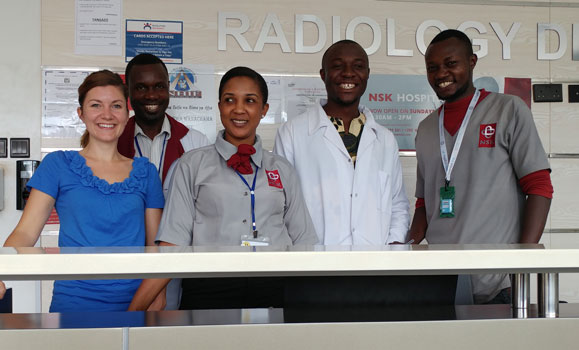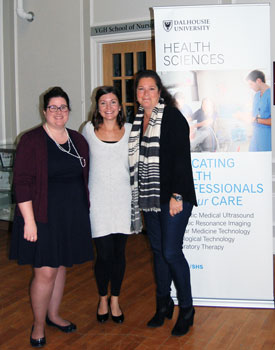News
» Go to news mainRAD AID: Dal chapter brings radiological technology to underserved communities

According to the World Health Organization, approximately three to four billion people are at risk for deaths that can be avoided or treated, if radiology were available. Radiology is a part of nearly every segment of health care, including pediatrics, obstetrics, medicine and surgery, making the absence of radiology a critical piece of global health disparity.
Anne-Marie Lugossy (BHSc ‘17, DEC Radiodiagnostic ‘06) is a radiological technologist with the Nova Scotia Health Authority (NSHA) working at multiple sites across the NSHA western zone. For as long as she can remember, she always had a passion for global outreach and searched to find an organization with which her skills were compatible.
As a recent School of Health Sciences post diploma graduate, she received a Canadian Association of Medical Radiation Technologists RAD-AID International Fellowship and travelled to Arusha, Tanzania to help implement a radiology department in a new hospital last February. The experience motivated her to return in October on another self-funded trip that focused on breast cancer education and patient awareness. As Anne-Marie returned to the same hospital, she was thrilled to see that their earlier training was still in place and being maintained.
The future of healthcare
“I met a wonderful team of local technologists, nurses, doctors, and a radiologist who were all committed to improving health outcomes for the people of Tanzania. Their passion and commitment for health care really spoke to me, “she said. “Tanzanian culture is absolutely beautiful. The people have strong beliefs in community and family. They have a positive outlook, even through tough times.” She strongly wants students and alumni to know that, “regardless of your experience, it is possible for you to achieve great things that will help improve our health care system. You are the future of healthcare, Become leaders in your field!”
RAD-AID began in 2008 to answer the need for more radiology and imaging technology in resource-limited communities around the world. Its mission is to increase and improve radiology resources in underserved regions of the world. RAD-AID programs find multidisciplinary solutions, including economic development (business planning for facilities using radiology equipment and personnel), clinical innovation, technology development, educational training of health workers, and public health strategies.
Inspired by a presentation at the Canadian Association of Medical Radiation Technologists national conference in 2016, Melissa Sponagle (BHSc’08, Nuclear Medicine Faculty) and Stephanie Lea (MAHSR’10, Radiological Technology Faculty) realized very quickly that the School of Health Sciences was perfectly situated to start a RAD-AID chapter. With all four diagnostic imaging modalities at the School (MRI, Nuclear Medicine Technology, Radiological Technology, and Sonography); close ties with local and national technologists, and collaborations with others in the Faculty of Health and Medicine, this was a perfect fit.
Bringing RAD-AID to Dal
They worked diligently on the process, motivated by Anne-Marie’s experiences and support and in November at the Annual Recognition Reception, after Anne-Marie's heartfelt address to the students, it was announced that Dalhousie University had officially formed a chapter. The
School of Health Sciences’ strong commitment to healthcare and passion for their work enabled them to proceed with becoming only the second chapter in Canada. The chapter is currently working with RAD-AID management to determine an appropriate project for our faculty and students to participate in, with a long-term goal of collaborating with other Dalhousie faculty’s to lead the development of a RAD-AID program in an underserved region in Canada.
The team behind Dal's RAD-AID Chapter (L-R) Melissa Sponagle, Anne-Marie Lugossy and Stephanie Lea. (Provided photo)
The chapter is currently working with RAD-AID management to determine an appropriate project for our faculty and students to participate in, with a long-term goal of leading the development of a RAD-AID program in an underserved region in Canada.
“We are so proud of Anne-Marie and the work that she has done with RAD-AID,” says Carol Gillis, Director, School of Health Sciences. “As a School of Health Sciences alumna, she is such a wonderful role model. Her enthusiasm is infectious, and she inspires others to get involved. The formation of a chapter at Dalhousie University is an exciting initiative for us and I cannot wait to see how our students and alumni will impact and contribute to improving health care in our communities: not only throughout Canada but around the world!”
Next steps
What’s next for Anne-Marie? She recently presented on her experience at the RAD-AID International Conference in Washington DC and has become a volunteer program manager with the organization, assisting with the selection of technologist candidates for outreach trips. She is also applying for graduate studies to pursue global outreach work. In the long run, she hopes to work internationally to help improve health outcomes for underserved areas. She will continue her work with RAD-AID. Anne-Marie feels it is important that her two young children to understand the importance of helping others. She wants to lead by example, so that, “hopefully, they will one day want to get involved in volunteer work.”
Learn more:
For more information on Dalhousie’s RAD-AID Chapter please contact:
Melissa Sponagle
melissa.sponagle@dal.ca
902.473.6474; or
Stephanie Lea
stephanie.lea@dal.ca
902.473-5513
Recent News
- Applications open for Leon & Rose Zitner Prize
- Practicing what we preach: The importance of leisure and recreation for those who study, teach and work in health
- Dal Health announces new Associate Dean, Equity and Inclusion
- New Director announced for College of Pharmacy
- PhD in Health candidate recognized for her innovation in cancer research
- Dal Health’s School of Nursing to offer Atlantic Canada’s First Master of Nursing, mental health and addictions
- Dr. Catherine Mah is taking aim at social impacts on food purchasing and diet
- Faculty of Health research project finds creative culmination in Nocturne 2023 exhibit

